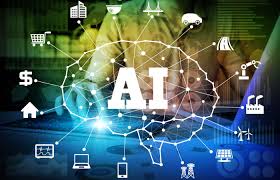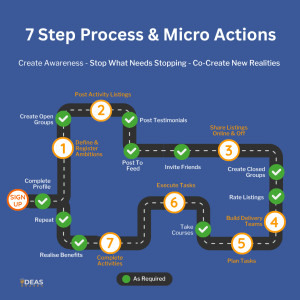Is AI Really Taking Your Job?
Vote To Prioritise Activity Listing
You must be logged in to rate.
Activity Description
And What Happens If None of Us Have Work to Go To?
Artificial Intelligence (AI) is no longer science fiction. It is here, in our offices, our homes, our hospitals, our cars, and in almost every aspect of modern life. From chatbots answering customer queries, to algorithms writing code, to systems that can generate entire videos and marketing campaigns in minutes — AI is everywhere.
The question that dominates the media and fuels debates at every level is this: Is AI taking your job? And even more worrying: What happens if none of us have work to go to?
This isn’t just about economics. It’s about purpose, identity, community, and how we structure society when the traditional 9–5 job no longer exists in the way we once understood it.
This article examines the realities of AI and automation, the risks, the opportunities, and the deeper human questions. It will challenge assumptions, explore scenarios, and propose ways we can reshape society to ensure progress benefits everyone, not just a privileged few.
The Myth and the Reality — Is AI Really Taking Jobs?
Let’s start with the blunt truth: AI is already displacing jobs.
> Customer Service: Millions of queries once handled by human operators are now dealt with by chatbots.
> Transport: Self-driving vehicles are edging closer to mass adoption. Taxi drivers, truck drivers, and delivery riders are all at risk.
> Finance and Legal: AI can analyse contracts, manage portfolios, and detect fraud faster and cheaper than humans.
> Healthcare: Diagnostic systems can spot patterns in medical scans better than radiologists in some cases.
> Education: Personalised AI tutors are challenging the very idea of one teacher to many students.
> Creative Industries: Designers, writers, musicians, and video editors now compete with algorithms that can generate professional-level content in seconds.
But here’s the nuance: AI isn’t always replacing jobs outright. Often, it’s transforming them. A lawyer might spend less time scanning documents and more time strategising. A teacher might shift from lecturing to coaching. A doctor might focus less on diagnosis and more on empathy and patient care.
So, is AI taking jobs? Yes. But it’s also changing the nature of work itself.
The Deeper Question — What Happens If Jobs Disappear Altogether?
The Industrial Revolution shifted millions from farms to factories. The Digital Revolution shifted millions more from factories to offices. Each time, new industries and new jobs eventually replaced the old ones.
But what if this time is different?
What if AI doesn’t just automate one sector at a time, but all sectors simultaneously? What if the pace of change outstrips our ability to retrain and adapt?
Imagine:
> Factories with no workers — fully automated production lines.
> Offices with no staff — algorithms handling administration, finance, and even decision-making.
> Shops with no cashiers — checkout-free experiences becoming the norm.
> Transport with no drivers — fleets of autonomous vehicles on the road.
If that world comes to pass, the traditional idea of “work” as the central organising principle of society collapses. And with it, the structures we take for granted: salaries, pensions, mortgages, taxes, even the 40-hour week.
Why Jobs Matter Beyond Money
At this point, we must pause and ask: Why do jobs matter?
Most people think of work as a way to earn money. But work is far more than that. It provides:
> Identity: “What do you do?” is often the first question we ask when meeting someone new.
> Purpose: Work gives us goals, responsibilities, and progress.
> Community: Colleagues, clients, and networks give us human connection.
> Status: Work defines how society perceives us.
> Structure: Jobs organise our days, weeks, and years.
If AI strips away jobs, it strips away much of what makes modern life feel meaningful. That is why the AI revolution is not simply an economic challenge — it’s a societal and even existential one.
The Opportunity of AI — Beyond Fear
But we mustn’t only dwell on the fear. AI could be the greatest liberator in human history.
Imagine a society where:
> Routine and dangerous work is handled by machines.
> People are free to pursue passions, creativity, and lifelong learning.
> Communities thrive on collaboration instead of competition for scarce jobs.
> Progress is measured not by GDP alone, but by wellbeing, innovation, and societal contribution.
This isn’t utopian fantasy. It’s a logical outcome if we harness AI wisely.
The real challenge isn’t AI itself. It’s whether humanity can design systems, policies, and cultures that ensure the benefits are shared fairly.
The Risks of Getting It Wrong
If we fail, the risks are stark:
> Mass Unemployment: Entire industries collapsing without alternatives.
> Widening Inequality: A few tech giants owning the algorithms, while billions are left behind.
> Social Polarisation: Tension between those who benefit from AI and those who don’t.
> Loss of Purpose: Depression, disconnection, and despair on a global scale.
> Political Instability: A world where people without work lose faith in governments and systems.
This is why AI is not simply a technology issue. It is a political, economic, and moral one.
New Models for a Post-Work Society
So, what can be done? Several models are being debated globally:
> Universal Basic Income (UBI): Everyone receives a baseline income, regardless of employment status.
> Shorter Working Weeks: Spreading the remaining work across more people.
> Reskilling and Lifelong Learning: Preparing people for new roles alongside AI.
> Redefining Value: Recognising unpaid contributions like caregiving, volunteering, and community work.
> Ambition Economies: Platforms like Ideas-Shared that channel human energy into meaningful activities beyond jobs.
The point is this: if jobs shrink, society must evolve. We must decouple human worth from employment.
Humanity’s Logical Next Step
Here’s the paradox: AI is built on logic, algorithms, and efficiency. But for humanity to thrive, we must go beyond logic alone.
We need humanity: empathy, fairness, collaboration, creativity, and shared purpose.
That’s why initiatives like Ideas-Shared exist. Not as another social media distraction, but as a platform where people can take action, connect, and deliver outcomes together — whether or not they have traditional jobs.
Because even if machines do the work, only humans can set the vision, values, and goals for the future we want.
The Future Is a Choice
So, is AI really taking your job?
Yes — and no. AI is reshaping work at a scale we’ve never seen before. Some jobs will vanish, others will transform, and entirely new categories will emerge.
But the deeper question is this: What happens if none of us have work to go to?
The answer is not predetermined. It depends on the choices we make now — as individuals, as communities, and as a global society.
We can cling to fear and watch inequality widen. Or we can embrace the opportunity, redesign systems, and build a future where AI liberates humanity from drudgery and unlocks our highest potential.
The path forward requires courage, collaboration, and imagination. It requires us to treat AI not as an enemy, but as a partner — while ensuring humanity stays firmly in the driving seat.
The choice is ours.
Key Takeaways
AI is already transforming jobs across every sector.
The biggest challenge is not unemployment, but loss of purpose and identity.
If managed well, AI could liberate humanity from drudgery and open new possibilities.
If mismanaged, AI could deepen inequality and destabilise society.
The future of work requires new systems: UBI, reskilling, shorter weeks, and platforms for collaboration.
Humanity must lead with logic and compassion.
Road Map
That’s another reason why we’ve built the Ambition Economy — a space where individuals, teams, and organisations can co-create, solve problems, and deliver outcomes together.
Join us. Share your ambition. Connect with others. Take action. Because the future isn’t about waiting for AI to decide. It’s about what we decide to do with it.
Tags
Location & Impact Details
Links
Contact Details
There are no reviews yet.



